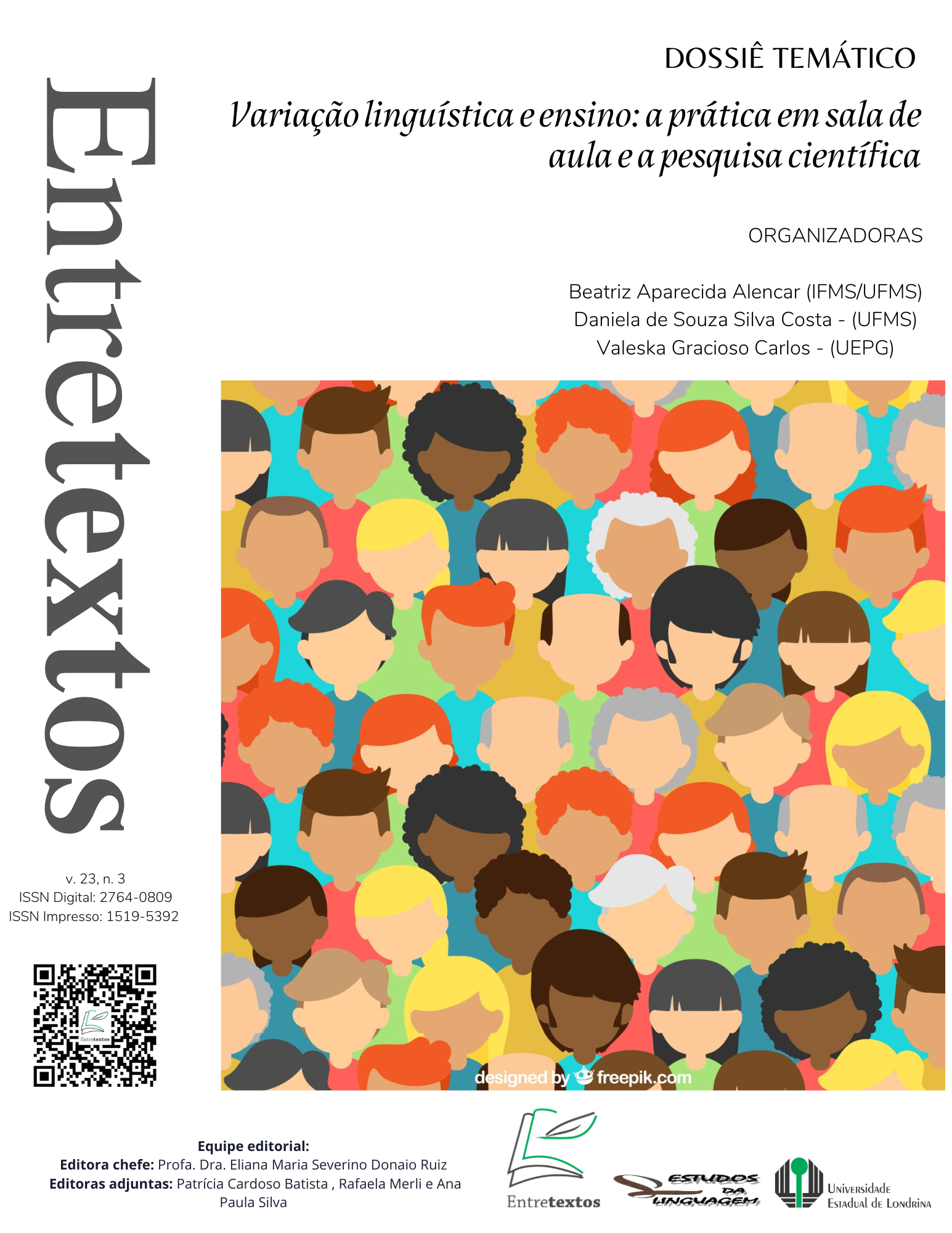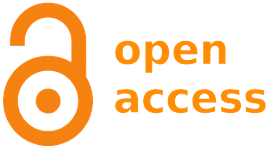O ensino de português e a problemática abordagem da variação linguística em livros didáticos
DOI:
https://doi.org/10.5433/1519-5392.2023v23n3p28-48Palavras-chave:
variação linguística, livro didático, ensino de português brasileiroResumo
Este trabalho tem por objetivo analisar o tópico "variação linguística" em livros didáticos de língua portuguesa do ensino médio, aprovados no Plano Nacional do Livro Didático 2021. Para realizar a análise, apresentamos pressupostos do ensino de língua portuguesa a partir dos anos 1980, sobretudo Geraldi (2002) e Soares (1986), com destaque para a entrada da concepção de gênero discursivo (Bakhtin, 2003) no final do século passado. Propomos uma análise qualitativo-interpretativista, pelo viés da Linguística Aplicada Indisciplinar (Moita Lopes, 1994, 2006, 2022), realizando um estudo documental, no qual os sete livros aprovados constituem o material selecionado. Os resultados apontam para a presença do tópico "variação linguística" em todos os livros, bem como aspectos ligados a preconceito linguístico. No entanto, a concepção de língua como interação social, consagrada nos estudos de gêneros discursivos, parece não contemplar o referido tópico, apresentado por atividades atreladas à avaliação do uso linguístico, as quais acabam por enfatizar concepções tradicionais de língua. Por fim, defendemos o ensino do português brasileiro como centro do trabalho pedagógico, a partir da metáfora do "roçado linguístico", abandonando, assim, a noção de "adequação linguística" para assumir o "esperançar" (Freire, 2020) do "agonismo" (Foucault, 2011), para nós, "agonismo linguístico".
Downloads
Referências
BAGNO, Marcos. Português ou brasileiro: um convite à pesquisa. São Paulo: Parábola Editorial, 2004.
BAGNO, Marcos. Preconceito linguístico. 56. ed. São Paulo: Parábola Editorial, 2015.
BAGNO, Marcos. Dicionário crítico da Sociolinguística. São Paulo: Parábola Editorial, 2017.
BAGNO, Marcos. Objeto língua. São Paulo: Parábola Editorial, 2019.
BAKHTIN, Mikhtin. Os gêneros do discurso. In: BAKHTIN, Mikhtin. Estética da criação verbal. Tradução de Paulo Bezerra. São Paulo: Martins Fontes, 2003.
BORTONI-RICARDO, Stella Maris. Educação em língua materna: a sociolinguística na sala de aula. São Paulo: Parábola Editorial, 2004.
BORTONI-RICARDO, Stella Maris. Nós cheguemu na escola, e agora?: sociolinguística & educação. São Paulo: Parábola Editorial, 2005.
BORTONI-RICARDO, Stella Maris. Português brasileiro, a língua que falamos. São Paulo: Contexto, 2021.
BRASIL. Secretaria de Educação Fundamental. Parâmetros Curriculares Nacionais: terceiro e quarto ciclos do ensino fundamental: língua portuguesa. Brasília: MEC/SEF, 1998.
BRASIL. Ministério da Educação e Cultura. Base Nacional Comum Curricular. 2018. Disponível em: http://basenacionalcomum.mec.gov.br/. Acesso em: 10 set. 2023.
FARACO, Carlos Alberto. Português: os desafios de uma língua pluricêntrica no século 21. In: ALVES, Adriana Célia et al. (org.). I Conecta leitores: diversidade e cooperação no ensino de língua e literatura do Brasil no exterior. II Conecta Leitores: desafios e perspectivas no ensino e promoção de língua portuguesa e culturas brasileiras no exterior. Brasília: FUNAG, 2023. p. 33-46.
FOUCAULT, Michel. A coragem da verdade. Tradução de Eduardo Brandão. São Paulo: WMF Martins Fontes, 2011.
FREIRE, Paulo. Pedagogia da esperança. São Paulo: Paz & Terra, 2020.
GERALDI, João Wanderley (org.). O texto na sala de aula. 3. ed. 5. reimpr. São Paulo, Ática, 2002.
GNERRE, Maurice. Linguagem, escrita e poder. São Paulo: Martins Fontes, 1991.
GONZÁLEZ, César Augusto. Variação linguística em livros didáticos de português para o EM. In: ZILLES, Ana Maria Stahl; FARACO, Carlos Alberto (org.). Pedagogia da variação linguística: língua, diversidade e ensino. São Paulo: Parábola Editorial, 2015. p. 225-248.
MACHADO, Vanda. Áqueles que tem na pele a cor da noite: ensinâncias e aprendências com o pensamento africano recriado na diáspora. 2006. 222f. Tese (Doutorado em Educação) - Universidade Federal da Bahia, Faculdade de Educação, Universidade Federal da Bahia, Bahia, 2006.
MOITA LOPES, Luiz Paulo. Por uma linguística aplicada INdisciplinar. São Paulo: Parábola Editorial, 2006.
MOITA LOPES, Luiz Paulo. Pesquisa interpretativista em linguística aplicada: a linguagem como condição e solução. DELTA, v. 10, n. 2, 1994. Disponível em: https://revistas.pucsp.br/index.php/delta/article/view/45412. Acesso em: 5 mar. 2023.
MOITA LOPES, Luiz Paulo da (org.). Estudos queer em linguística aplicada indisciplinar: gênero, sexualidade, raça e classe. São Paulo: Parábola Editorial, 2022.
PUH, Milan. Políticas linguísticas, decolonialidade e material linguístico no Brasil. In: Isis Ribeiro Berger; Rosângela Redel (org.). Políticas de gestão do multilinguismo: práticas e debates. São Paulo: Pontes Editores, 2020, v. 1, p. 207-237.
SOARES, Magda. Linguagem e escola: uma perspectiva social. 2. ed. São Paulo: Ática, 1986.
VIEIRA, Francisco Eduardo; FARACO, Carlos Alberto. Gramática do Português Brasileiro Escrito. São Paulo: Parábola Editorial, 2023.
VOLÓCHINOV, Valentin. Marxismo e filosofia da linguagem: problemas fundamentais do método sociológico na ciência da linguagem. Tradução de Sheila Grillo e Ekaterina Vólkova. São Paulo: 34, 2017.
Downloads
Publicado
Como Citar
Edição
Seção
Licença
Copyright (c) 2024 Pedro Henrique Souza da Silva, Marcelo Rodrigues de Lima, Adriane Teresinha Sartori

Este trabalho está licenciado sob uma licença Creative Commons Attribution 4.0 International License.
Entretextos adota a Licença Creative Commons Attribution 4.0 International, portanto, os direitos autorais relativos aos artigos publicados são do/s autor/es.
Sob essa licença é possível: Compartilhar - copiar e redistribuir o material em qualquer suporte ou formato. Adaptar - remixar, transformar, e criar a partir do material, atribuindo o devido crédito e prover um link para a licença e indicar se mudanças foram feitas.
Dados de financiamento
-
Coordenação de Aperfeiçoamento de Pessoal de Nível Superior
Números do Financiamento 001























